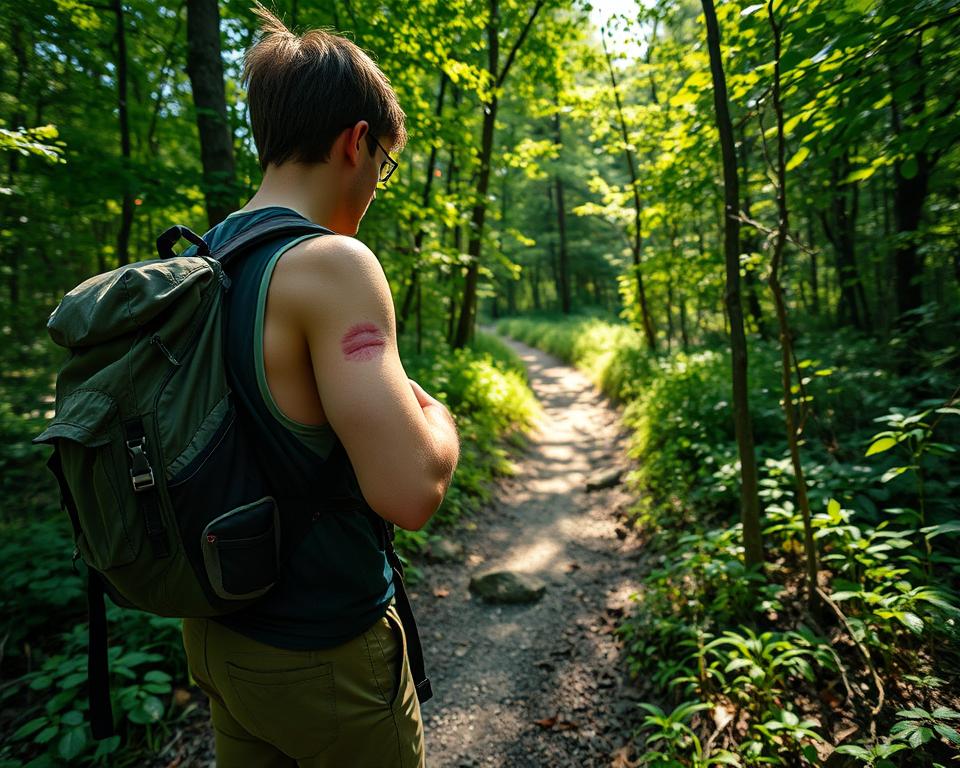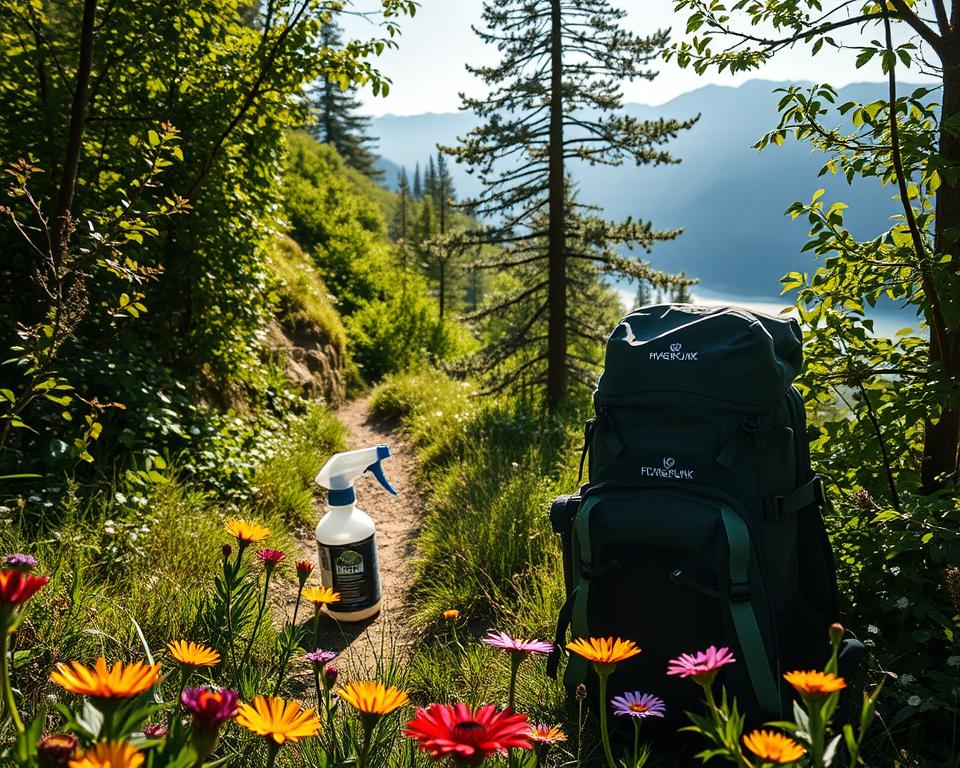Warm weather means many look forward to exploring the trails. But, it’s important to be ready for insects too. Experts like the CDC stress the need to prevent bites. This helps avoid diseases such as Lyme and malaria from mosquitoes and ticks.
My hikes in places like Minnesota parks and Vietnam’s jungles taught me how to keep bugs away. Knowing how to prevent and treat insect bites makes hiking better.
Wearing long sleeves and pants that are tucked into your socks helps. It creates a barrier against bites. Using permethrin spray on clothes and repellents like Picaridin or DEET also helps. Try products like Sawyer permethrin spray to stay bite-free.
It’s also smart to pick your campsite carefully and check for ticks every day. These steps, along with knowing some first aid for bites, mean you can hike with less worry.
Understanding Common Insects on the Trail
While hiking, knowing about common trail insects is key. This includes mosquitoes, ticks, flies, and chiggers. Each brings its own challenges and dangers. Learning about their habits and how to stay safe can make your hike better.
Mosquitoes
Mosquitoes love areas with still water and lots of plants. They are most active early in the morning and at twilight. To avoid mosquito bites, wear clothes treated with permethrin. This treatment is almost 74 times more effective against bites.
Also, using bug sprays like DEET or picaridin on bare skin helps. Clothes treated with permethrin are durable and great for those who hike a lot.
Ticks
Ticks are found in forests and places with lots of bushes. They wait in tall grass or plants. To prevent tick bites, wear long clothes and tuck your pants into your socks. Use tick repellent too.
A study from URI showed that shoes treated with permethrin can greatly reduce tick bites. Wearing these, especially in peak season, helps outdoor workers in places like North Carolina avoid ticks.
Flies and Chiggers
Flies and chiggers live in wooded or grassy spots near water. Black flies are very aggressive, and female ones bite to feed on blood. Chiggers are tiny but cause big itchiness. To prevent bites, cover up with clothes and use bug spray.
Wearing the right clothes and applying repellent correctly protect against these pests outdoors. This makes enjoying nature easier and safer.
Preventing Insect Bites While Hiking
To make your hikes better and keep healthy, stopping insect bites is key. You need the right clothes, good repellents, and a smart campsite choice. Each step helps keep annoying bugs away. Let’s dive into how to stop insect bites during hikes.
Wearing Proper Clothing
Wearing the right clothes is essential for avoiding bites. Choose protective clothing that’s light-colored, lightweight, and covers your body. Such clothing makes it harder for insects to bite you. Adding clothes treated with permethrin gives extra protection. A study by the University of Rhode Island found permethrin-treated clothes reduce tick bites by 73.6 times.
Using Insect Repellents
Using repellents is crucial too. Go for products with DEET, Picaridin, IR3535, or natural oils like lemon eucalyptus. Thermacell products create a 15-foot area free of bugs. Natrapel provides 8 hours of protection without DEET. The EPA says DEET is safe for fighting mosquitoes, ticks, and others when used right.
Choosing the Right Campsite
Picking the best campsite is vital for bug bite prevention. Choose spots away from water and thick plants where bugs live. Adding a bug net, like the ENO Guardian, helps. Also, using fire or special matches can keep bugs away. Avoiding outdoor activities at dawn and dusk helps too, as bugs are very active then. These camping tips help make your outdoor time enjoyable without bugs.
Handling insect bites on the trail
The great outdoors is full of adventure, but it comes with challenges. One common problem for hikers is insect bites. Knowing how to handle them makes your hike enjoyable and safe. Here are tips for when insects bite.
Identifying Different Bites
Identifying the insect that bit you is key to proper first aid. Mosquito bites look like raised welts with a mark in the center. Tick bites might show as red welts or a bullseye pattern, especially from ticks carrying Lyme disease. Improve your insect bite identification skills to respond well and keep calm.
Immediate First Aid Techniques
After a bite, clean the area with soap and water to avoid infection. To ease itching, try antihistamines or hydrocortisone cream. Use cold compresses to lessen swelling. If you’re allergic, always have two Epi-Pens handy for reactions, particularly to bee stings. These steps are key to handle bug bites effectively.
Products to Carry
Your hiking kit should have items to deal with insects. Here’s what you need:
- Permethrin sprays and picaridin lotions work great as repellents.
- Tick removers are vital for safe tick removal and avoiding infection.
- Disinfectants like alcohol wipes clean bites and help prevent issues.
- Anti-itch creams or gels soothe bites and reduce discomfort.
Some brands, like Ex Officio and Columbia, sell clothes treated with repellents. These clothes can keep bugs away for up to 70 washes. Having these products means you’re ready to deal with insect bites outdoors.
Following these tips on identifying and treating insect bites will prepare you for any bug problem on the trail. Being well-prepared lets you enjoy your hike without worrying about insects.
Natural Remedies for Insect Bites
When you go hiking, meeting insects and getting bitten is common. But, you don’t have to just use regular medicine. Let’s talk about natural ways to soothe itching, swelling, and discomfort from insect bites.
Aloe Vera
Aloe vera is a top natural remedy for bites. It’s known for calming skin, reducing swelling, and making you feel better right away when you put it on a bite. Aloe vera’s cool feel lessens the burn and itch from bites.
Tea Tree Oil
Tea tree oil is a great natural antiseptic. For bites, it stops infection and cuts down on itching and swelling. Mixing a few drops of tea tree oil with another oil can greatly help a bitten spot. This is a good choice for those who like using plants for healing.
Calamine Lotion
Calamine lotion is famous for easing itch from bites. It works really well on mosquito and chigger bites, which turn into red, itchy spots. Putting calamine lotion on these bites quickly helps and makes them heal faster.
Essential Oils
Essential oils like lemongrass, peppermint, and eucalyptus are not only for keeping bugs away. They also help if you’re bitten. Making your own bug spray with these oils is easy. It’s perfect for people who have sensitive skin.
Choosing natural remedies like aloe vera, tea tree oil, calamine lotion, and essential oils is a great plan for insect bites. Whether it’s mosquito, tick, or other bug bites, these eco-friendly options are great to try.
When to Seek Medical Attention
Whenever you’re out hiking and an insect bites you, it’s important to know when to get medical advice. While many bites are not serious and you can treat them at home, sometimes you need a professional. This is true for certain bug bites.
Knowing the signs of a serious insect bite can save your life. For instance, if you get a fever, headache, or feel really tired after a bite, see a doctor right away. These symptoms might mean you have Lyme disease, which is more common in certain parts of the U.S. Untreated Lyme disease can badly affect your joints, heart, and nerves.
If you see a rash that looks like a bullseye after a bite, get checked out to make sure it’s not Lyme disease. Look out for red, tender streaks leading away from the bite or a skin infection like impetigo. Impetigo can turn into cellulitis if you don’t treat it. Cellulitis symptoms include redness, fever, swollen lymph nodes, chills, and pus and affects about 1 in 40 people.
Severe allergic reactions to bites may require urgent treatment with epinephrine. If you feel chest pain, have trouble breathing, wheeze, or can’t swallow, get emergency help. For more information, visit this guide on insect stings and when to worry.
If an insect bite doesn’t get better with home treatment, see a doctor. Being aware of the advice on insect bites and recognizing serious symptoms are key. This helps you get fast treatment to avoid complications like sepsis or abscesses on the skin.
Real-Life Experiences and Lessons Learned
On my hiking adventures, I’ve faced various challenges and learned a lot about handling insect bites. These insights come from my experiences and stories from other hikers. They show how to protect yourself and handle surprises.
Personal Stories from Hikers
One unforgettable hiker experience with bites happened in Minnesota. I had tried many mosquito repellents in places like Glacier National Park and Vietnam. I preferred Picaridin because DEET products irritated my skin. My friend, however, liked a homemade repellent made from essential oils. She believed it was a natural protection without harsh chemicals.

I always spray my clothes with permethrin before hiking. It keeps working for about six washes. Wearing light and breezy clothes also reduces bites. Another hiker mentioned she uses DEET-free repellents like Bug Soother and Herbal Armor. She likes them because they’re not greasy.
Dealing with Tick-Borne Illnesses
Tick encounters worried me during my hikes, especially after hearing tick-borne illness stories from others. In the Northeastern US, Lyme disease is a real threat. I learned to wear clothes treated with permethrin and use repellents with DEET or Picaridin. After hiking, I check for ticks in places like underarms and knees. Once, a friend suggested carrying a tick remover. It was a lifesaver when I found a tick on my leg in Pennsylvania.
Handling Severe Allergic Reactions
Dealing with allergic reactions outdoors is vital for hiking safety. On a tough hike in the Colorado Rockies, one hiker had a bad reaction to a sting. He had an epinephrine auto-injector, which quickly helped him. This taught me to always be prepared with the right emergency treatments. Now, I carry antihistamines and an epinephrine pen, just in case.
What Should I Do About Insect Bites If I’m Already Dealing with Blisters While Hiking?
When faced with the dual challenge of insect bites and blisters while hiking, prioritize proper care. Clean the affected areas gently, applying an anti-itch cream for insect bites. Focus on preventing and treating hiking blisters by keeping feet dry and using blister pads, ensuring comfort on the trail.
Conclusion
In wrapping up outdoor insect bite management, it’s key to use a multi-pronged approach. Wearing permethrin-treated clothes and choosing effective repellents like DEET or Picaridin are important. Also, picking a good campsite can lower your chances of bug bites, enhancing your outdoor fun.
It’s crucial to know how to spot and treat insect bites right away. Having the right products and first aid knowledge helps deal with bites quickly. Natural remedies like aloe vera and tea tree oil can also relieve pain fast. Here’s a helpful link for managing kids’ insect bites, with more advice.
The best defense combines learning and being ready. Knowing about bugs and how to protect yourself helps a lot. By taking the right steps after a bite, you lower the risk and hassle of insect bites. These tips can keep you safe and make your hiking trips more enjoyable. Stay informed and ready, so your nature outings stay pleasant.

